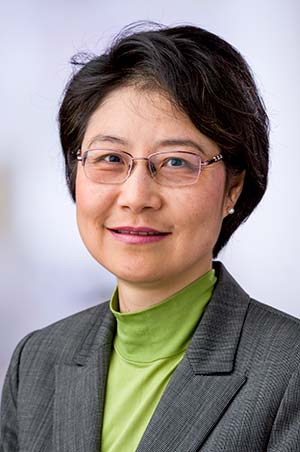Min Fang, MD, PhD
Professor
Translational Science and Therapeutics Division, Fred Hutch
Dr. Min Fang is a physician who specializes in clinical molecular genetics. She studies changes in DNA that could potentially lead to cancer. By understanding these changes at the molecular level, Dr. Fang seeks to identify abnormalities that could both diagnose cancer early and serve as actionable biomarkers to guide treatment. She also studies the genetic profiles of disseminated tumor cells — cancer cells that migrate from primary tumors to other regions of the body.
Clinical Expertise
Dr. Fang is board-certified in Clinical Molecular Genetics and Clinical Cytogenetics. Her current clinical service is as Director of the Cytogenetics and Genomics Division, responsible for the clinical operation of these diagnostic laboratories at both University of Washington and Fred Hutchinson Cancer Center. The labs perform cytogenetic/molecular testing on adult and pediatric cancer patients undergoing treatment or hematopoietic cell transplantation, in addition to general genetic testing services for OB/GYN clinics and genetics clinic, providing prenatal diagnosis and postnatal diagnosis for inherited genetic disorders. Dr. Fang is currently the President of Cancer Genomics Consortium (CGC). She has served as the Cytogenetics Subcommittee Chair of SWOG Leukemia Committee since 2009 and was the Chair of the Publication and Communication Committee of the Association for Molecular Pathology (AMP) and a member of the AMP Board of Directors. Prior to relocating to Seattle, Dr. Fang was Director of Human Molecular Genetics laboratory and Section Chief for Oncology Cytogenetic Testing at the University of Connecticut Health Center.
Other Appointments & Affiliations
Affiliate Investigator, Clinical Research Division, Fred HutchAffiliate Investigator
Clinical Research Division, Fred Hutch
Professor, Pathology
University of Washington
Director, Cytogentics
Fred Hutchinson Cancer Center
Director, Division of Cytogenetics and Genomics
University of Washington
Adjunct Professor, Laboratory Medicine
University of Washington
Education
Stanford University Medical Center, 2001, Fellowship in Clinical Molecular Genetics and Clinical Cytogenetics
University of Alabama at Birmingham, 1998, PhD
Shanghai Medical University, 1990, MD
Research Interests
The focus of Dr. Fang's laboratory research is on the genomics and combinatorial genetics/epigenetics of human neoplasia. Combining classical genetic approaches of mapping, karyotyping, fluorescence in situ hybridization (FISH), single-gene mutation analysis, bisulfite sequencing, and functional genetics with new genomic tools including chromosome genomic array testing (CGAT), next-generation sequencing, and whole genome sequencing, we aim to identify genetic and epigenetic aberrations in cancer that are prognostically significant and may serve as actionable biomarkers for treatment decision making for individual patients. Dr. Fang's research is currently supported by funding from the National Institute of Health, SWOG, and private foundations.
Current Projects
Dr. Fang’s current studies focus on two diseases as representation of solid tumor and hematological malignancy. As part of a UW/Fred Hutch project grant for understanding the mechanism and markers for prostate cancer metastases, we genomically characterize the disseminated tumor cells (DTC) of prostate cancer, looking at correlates to progression and biological functions to explore the stem cell aspects of DTC and the role of DTC in tumor dormancy. We are extending our research to characterize circulating tumor cells (CTC) and cell-free DNA (cfDNA) as well. We also use high-throughput epigenetic tools to identify methylation markers important to distinguish indolent versus aggressive prostate cancer. For the study of acute myeloid leukemia (AML), we compare the global methylation profiling of good- and poor-outcome AML patients, especially those with normal cytogenetics, to identify differentially methylated genomic regions that will predict outcome and therapeutic response. Integrated studies of epigenetic and genomic/expression profiling, as well as functional pathway analyses, are important to help gain true insight into the pathophysiology of human cancer and to identify clinically useful diagnostic, prognostic, and predictive biomarkers.
